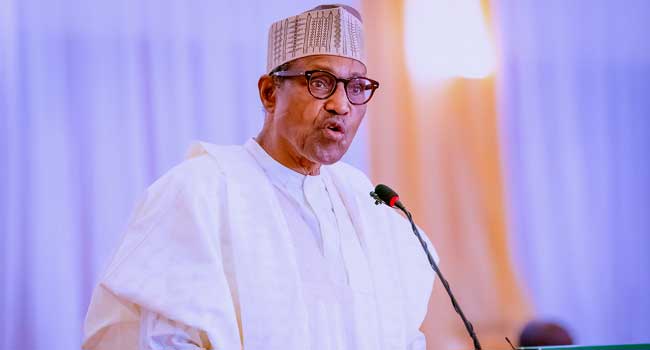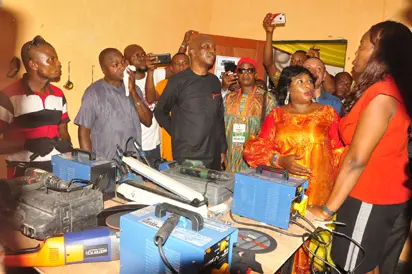- CSOs, opposition, accuse President of appointing APC members, sympathisers
- Don’t deny appointees right because of affinity with politicians, says party’s chieftain
President Muhammadu Buhari forwarded to the Senate via a letter dated July 25, 2022, names of 19 persons nominated as national commissioners of the nation’s apex election management body, the Independent National Electoral Commission (INEC).
Out of the 19 nominees, five were reappointed for a second and final term of five years while the remaining 14 are fresh appointments.
Reappointed are Ibrahim Abdullahi (Adamawa); Obo Effanga (Cross River); Umar Ibrahim (Taraba); Agboke Olaleke (Ogun); and Samuel Egwu (Kogi).
The 14 fresh nominees are ; Onyeka Ugochi (Imo); Muhammad Bashir (Sokoto); Ayobami Salami (Oyo); Zango Abdu (Katsina); Queen Elizabeth Agwu (Ebonyi); and Agundu Tersoo (Benue).
Others include; Yomere Oritsemlebi (Delta); Yahaya Ibrahim (Kaduna); Nura Ali (Kano); Agu Uchenna (Enugu); Ahmed Garki (FCT); and Hudu Yunusa (Bauchi);
The rest are Uzochukwu Chijioke (Anambra); and Mohammed Nura (Yobe).
The nominees were yet to be confirmed before the Senate proceeded on its recess but has passed the responsibility of screening them to the Committee on INEC .
However, a coalition of civil society organisations (CSOs) in Abuja at the weekend called on the Senate to halt the confirmation process due to some irregularities, particularly because of allegations that some of the nominees are political apologists.
They argued that if the nominees are confirmed without resolving questions surrounding their appointments, the 2023 election may after all not be credible as promised by President Buhari.
Among other concerns raised by the CSOs is the recent redeployment of Resident Electoral Commissioners and other top management staff by INEC . There are insinuations that movement of RECs few months to a major general election is questionable and may be part of a grand plan to compromise the election process.
Even, INEC was accused of gender insensibility, alleging that the Commission failed to apply the 35 percent affirmative action provision in it’s appointments.
At the Friday convergence of the CSOs, Lanre Arogundade, the Director, International Press Centre alleged that some of the nominees are partisan and of questionable past.
Specifically, he alleged that Muhammad Bashir, the nominee from Sokoto State, was a governorship aspirant under the All Progressives Congress (APC) in the 2015 general election.
Sylvia Agu, the nominee for Enugu State, he said, is believed to be the younger sister of the APC Deputy National Chairman, South-east.
He pointed out that the nominee for Imo State, Pauline Onyeka, who is a former Head of ICT at INEC in Imo state, has been accused of alleged corruption and connivance with politicians to fraught electoral process.
Faulting the nomination of Queen-Elizabeth Agwu, a former Accountant-General in Ebonyi State, he said, she was suspended allegedly on the grounds of incompetence and corruption in 2016.
Summing these up, he said the appointments if confirmed, cast doubt on the credibility, independence and capacity of INEC to deliver credible, transparent, conclusive and acceptable elections in 2023 and beyond.
Mr Arogundade also said their appointments will significantly undermine the neutrality and impartiality of the Commission and will increase mistrust in Nigeria’s electoral process.
“By the combined effect of Section 156(1(a) and Third Schedule, Part 1, Item F, paragraph 14(1), these individuals are constitutionally prohibited from any appointment as members of INEC.
“It will be against the sacred spirit of the Constitution to accept their nomination. Given their antecedent and close affinity with political parties, it is improbable that they will remain neutral and objective if successfully screened as INEC REC,” he submitted.
Harping mostly on what he described as perceived lopsidedness in the appointments, Jake Epkelle of the Albino Foundation, expressed worries that the appointments did not reflect the principles of non-discrimination and inclusivity – with regard to Persons with Disability (PWDs).
While he stressed the need to make the electoral process more inclusive, he argued that the appointments failed to recognize the provisions of the Discrimination Against Persons Living with Disabilities Act, 2018, and other legislations and guiding principles in that regard.
Other organisations that lend their voices to the call for a review of the nominations are Yiaga Africa, International Press Center, Center for Media and Society, the Albino Foundation, Elect Her, Nigerian Women Trust Fund, Partners for Electoral Reform, Inclusive Friends Association and the Kukah Centre.
In summary, the CSOs while rejecting the appointments called on President Buhari to withdraw their nomination in the public interest and in furtherance of his commitment to leave a legacy of a truly independent electoral institution.
They also called for a thorough examination and background checks of the credentials of the nominees.
They asked the Senate to reject the nominees that fall short of the threshold of non-partisanship and impeccable character.
“In making nominations into INEC, President Buhari should be guided by the judgment of the Federal High Court on affirmative action wherein the court directed that all appointments must comply with the 35% affirmative action for women.
“In the same vein, the President should ensure the representation of Persons with disability (PWDs) and young people in the appointments,” the CSOs concluded.
In the same vein, another body, the Transition Monitoring Group ( TMG) condemned the nominations of persons with political affiliations as Independent National Commission, INEC, Resident Electoral Commissioners, RECs.
Auwal Rafsanjani on behalf of TMG frowned at the danger that surreptitious nominations of card-carrying members of the ruling party, All Progressive Congress, into the Commission (INEC) portends for credibility of electoral process and acceptability of election results.
Referencing the provisions of 1999 Constitution are clear on the compositions, and major appointments into structure of the Electoral Body, Rafsanjani said “we are displeased by the apparent partisanship and favouritism reported through the nominations of the party’s card-carrying members as INEC Commissioners and State Resident Electoral Commissioners.”
He equally noted posers raised by concern Nigerians on the recent promotions and strategic deployments of top ranking INEC officials including RECs across the country and the fear that it might be part of a grand plan by the APC administration to “upturn votes or create inconclusive situations” that will be exploited by unscrupulous politicians in forcing or rigging their way into power.
“We are more concerned by the potential impact of such a major push from the Presidency on the overall credibility, transparency and integrity of the upcoming elections in 2023.
“Just as we condemn in totality the appointments of card-carrying members of any political party as a controlling strategy that can compromise the competence and objectivity of INEC, under which the independence and integrity of the Commission cannot be guaranteed to deliver free, fair and credible elections.
“TMG on this note call on President Muhammadu Buhari to in the spirit of his administration’s commitment to anti-corruption and transparency, withdraw all names of political party chieftains or card-carrying members contained in the nominations; and consider for immediate replacements, persons of integrity and unquestionable character, to demonstrate non-partisanship in the selections and nominations.
“We call on the National Assembly to reject confirmation of all nominated party chieftains and insist on transparency and non-partisanship in the selections, to uphold democratic value and electoral integrity, while proving respect for the sanity and sanctity of the rule of law.
“We also call on INEC to give detailed and verifiable positions of the nominated persons and rationale for their selections as well as prerequisite for the recent adjustments in the Commission’s structure and compositions at all levels,” Rafsanjani said.
The Deputy National Youth Leader of the Peoples Democratic Party (PDP), Hon. Timothy Osadolor though not speaking on behalf of the party aligned himself with the call by the CSOs for the rejection of such nominations.
He commended the insistence of Nigerians, particularly the CSOs for standing by the PDP during what he described as “fraudulent attempt” to sneak in Lauretta Onochie into INEC despite obvious evidence of her partisanship.
He said “Nigerian of all shades have no choice than to identify with our party when we raised the alarm over Onochie’s nomination and upon the party’s consistency with press conferences, protest matches and activities of the CSOs and activist lawyers, we prevailed and the Senate rejected her nomination through a face saving ground of federal character”.
Hon. Osadolor said it is not too late for President Buhari to withdraw names of nominees with question of partisanship.
“The President can easily find other eminently qualified Nigerians without baggages of partisanship as replacement, so that they can be screened and confirmed to fill existing vacancies in the Commission,” he said.
But a chieftain of the ruling All Progressives Congress (APC), Hon Tajudeen Olabisi Abioye said it is not enough to ask for rejection of the nominees without thorough probe of such blanket allegation of partisanship.
Abioye a former member of Kwara State House of Assembly and now APC candidate for the Offa/Oyun /Ifelodun Federal Constituency in the coming 2023 election said it is wrong for a nominee to be dropped just on mere allegation of affinity with a politician.
He agreed that a thorough background check should be carried out on nominees into any government positions as sensitive as INEC but frowned at unjust rejection on the ground of blood or marriage relationship with identified politicians.
Hon. Abioye, however, argued that such allegations may just be false alarms by the opposition party instigated CSOs. He premised his argument on the fact that the nominees must have been screened by security agencies which must have absolved them of such petty allegations before returning their names to the President to be forwarded for confirmation.
The Trumpet recalled nationwide condemnation that greeted the nomination and which eventually led to the rejection of Mrs Lauretta Onochie, an aide of President Buhari as INEC national commissioner.
President Buhari in October 2020, nominated her as an INEC commissioner to represent Delta State.
The appointment generated a public outcry from individuals, groups, and opposition parties and the CSOs with petitions written, protests staged, calling on the Senate to reject her.
During the screening process at the National Assembly, she told the Senate Committee on INEC that she quit politics in 2019 and that she was no longer partisan. Her claim was, however, faulted through an affidavit she swore to and evidence of her membership card of the ruling APC.
Her nomination was rejected by the Senate in July, 2021.though on the grounds that it flouted the principle of federal character.
In the report on the screening exercise presented by the chairman of the committee on INEC, Senator Kabiru Gaya, Onochie’s nomination was said to have been rejected because there is a serving INEC commissioner representing Delta state.
The report read “In the case of Ms Onochie’s…the Committee, bound by the provisions of Section 14(3) of the 1999 Constitution on Federal Character Principle… the Senate may wish to recall that in 2016, the Senate based on the recommendation of its INEC Committee confirmed Barr. May Agbamuche-Mbu from Delta State as a National Commissioner in INEC, who is still serving.
“…Confirming the nomination of Ms. Lauretta Onochie from the same Delta State will be a violation of the Federal Character Principle. Therefore, based on the provisions of Section 14(3) of the Constitution…and in order for the Committee and the Senate to achieve fairness to other states and political zones in the county, the Committee is unable to recommend Ms Lauretta Onochie for confirmation as a National Electoral Commissioner for INEC but would rather recommend to the Senate to request that the President makes another nomination,” the report read.
The Senate panel had said several petitions were written against her on grounds of violation of federal character principle, partisanship, being a card-carrying member of the APC and using her social media accounts fake news campaign strategies.
“But none of the reasons was good enough for Ms Onochie to be rejected but for the federal character principle.”






